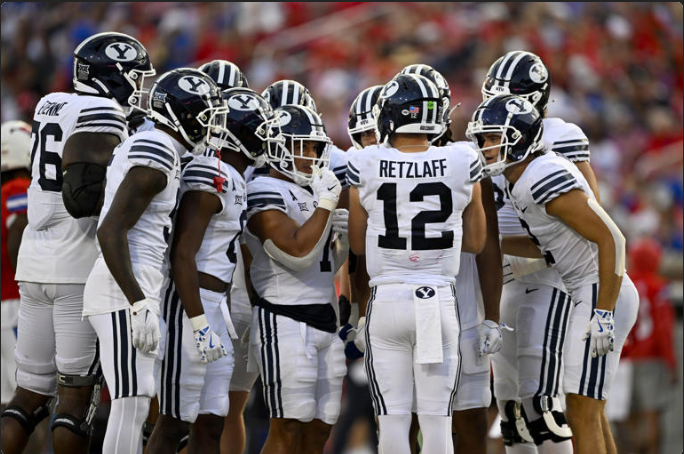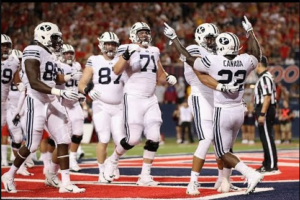
The Inspiring Reasons BYU Players Choose Latter-Day Saint Missions

Brigham Young University (BYU) stands out not just for its academic reputation but also for its unique cultural and religious environment, largely shaped by its affiliation with the Church of Jesus Christ of Latter-day Saints. One of the most defining features of this environment is the emphasis on missionary service among its students, particularly its athletes. For members of the church, serving a mission is not merely encouraged; it is a significant and revered aspect of their faith. This tradition holds a special place within the BYU Cougars football program, where approximately half of the players are members of the Church, and many of them take the opportunity to serve missions before, during, or after their athletic careers.
The decision to serve a mission often follows a deeply ingrained cultural narrative. Young men and women are encouraged to embark on two-year missions, and while participation is voluntary, the strong community support and church teachings make it an appealing path for many. These missions can take players to various cities across the globe, from bustling metropolises to remote communities, where they engage in various forms of service, teaching, and community building. In recent years, players from the BYU football team have served missions in 32 different countries and have learned 14 unique languages, adding to the diversity and richness of the university community.
BYU student-athletes generally fulfill their missionary obligations in one of two ways. Some choose to defer their enrollment until after completing their mission. This route allows them to immerse themselves in their missionary work without the added pressures of academic and athletic commitments. Others opt to serve their missions midway through their collegiate careers, taking a break from football and their studies to focus solely on their missionary responsibilities. This decision reflects a commitment to their faith that many BYU players carry with them as they balance their roles as athletes and as members of the Church.
The assignment process for these missions is unique. Missionaries are assigned to specific areas determined by church headquarters, and this process is devoid of personal requests or preferences. This means that players often find themselves in unfamiliar places, sometimes needing to learn a new language on the fly. This unpredictability serves to deepen their resilience and adaptability, traits that can be advantageous both on the field and in life.
The cultural impact of these missions extends beyond the players themselves. In fact, over 60% of BYU’s student body speaks a second language, a testament to the international exposure and experiences that students gain through their missions. This multicultural environment fosters a sense of community and understanding that enriches the university experience for all students, regardless of their backgrounds.
Notable players from BYU’s football history have exemplified this commitment to service. Figures such as Taysom Hill, a dynamic quarterback known for his versatility, and Dennis Pitta, a standout tight end, both took time away from their football careers to serve missions. Their stories not only reflect individual growth but also showcase how the values learned during their missions have translated into success on the field. Taysom Hill, for instance, has often credited his mission experience for shaping his work ethic and commitment to teamwork.
Players like Jaren Hall, who served from 2018 to 2022, and Isaac Rex, who played from 2019 to 2023, embody the blend of athleticism and spirituality that characterizes the BYU football program. Their experiences during missions have equipped them with life skills that enhance their performance in high-pressure situations. Similarly, defensive end Tyler Batty, who joined the team in 2020, has shared how his mission helped him develop not just as a player but as a person, instilling in him values of discipline, perseverance, and community service.
The intersection of athletics and faith is a central theme at BYU, shaping not only how players view their roles on the football team but also how they perceive their responsibilities as members of a faith-based community. Many athletes often find that their missions become foundational experiences that shape their approach to challenges, both on and off the field. The emphasis on hard work, service, and integrity learned during their time as missionaries frequently resonates throughout their athletic careers.
In addition to personal growth, missions serve to enhance the team’s dynamic. Athletes return from their missions with diverse experiences and perspectives, fostering camaraderie and mutual respect among teammates. This diversity strengthens the team’s ability to work together, as players learn to appreciate different backgrounds and viewpoints, ultimately contributing to a more cohesive unit on the field. This element of teamwork is invaluable, especially in a sport where success often hinges on how well players can collaborate and support one another.
The Church’s commitment to service aligns well with the values espoused by college athletics. BYU athletes are not only expected to excel in their sport but also to serve as role models within the community. This dual expectation cultivates a sense of responsibility that transcends the field of play. Players often engage in community service, mentorship programs, and outreach initiatives, reflecting the values learned during their missions.
Moreover, the integration of faith and athletics can be seen in the way coaches approach their programs. Coaches at BYU are mindful of the spiritual and personal development of their players. They foster an environment that encourages both athletic excellence and spiritual growth, understanding that these elements can coexist harmoniously. The emphasis on character development, ethical decision-making, and community service sets a standard for players, reinforcing the idea that being a successful athlete goes beyond physical prowess.
As BYU football continues to navigate the competitive landscape of college athletics, the mission experiences of its players remain a significant source of strength and identity. The Cougars represent not just a football program but a community deeply rooted in values of service, faith, and resilience. The emphasis on missionary service creates a distinctive culture that shapes the experiences of players, fans, and the broader university community.
Looking ahead, the impact of these missions will likely continue to reverberate throughout the BYU football program. As more players embark on their missionary journeys, they will carry forward the lessons learned during their service, enriching the team with their experiences and perspectives. This cycle of service, growth, and commitment to community underscores the unique relationship between BYU football and the principles of the Church of Jesus Christ of Latter-day Saints.
However, the commitment of BYU football players to serve Latter-day Saint missions is a defining feature of the program, shaping both the players and the culture of the university. These missions offer invaluable experiences that extend beyond the individual, contributing to a collective identity rooted in service, teamwork, and resilience. As BYU continues to build its legacy in college football, the lessons learned through missionary service will undoubtedly play a critical role in guiding the athletes on and off the field. The integration of faith and athletics creates a powerful narrative that emphasizes the importance of character, service, and personal growth—values that resonate deeply within the BYU community and beyond.

Leave a Reply